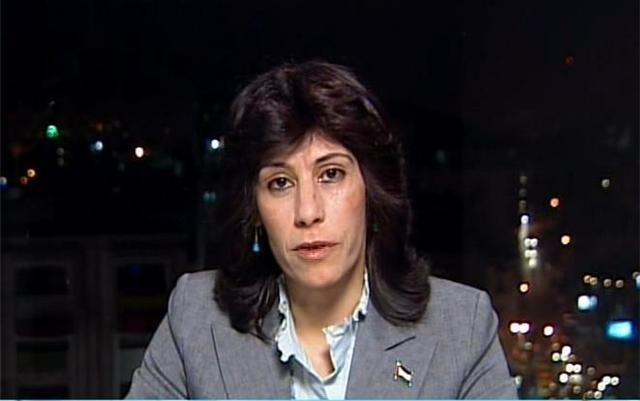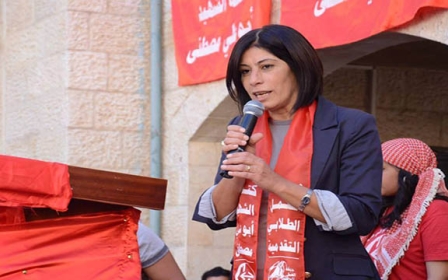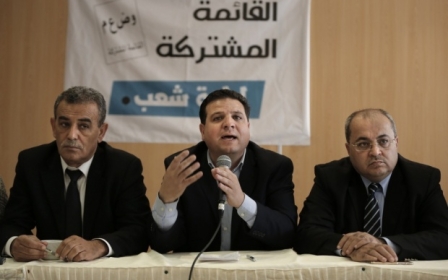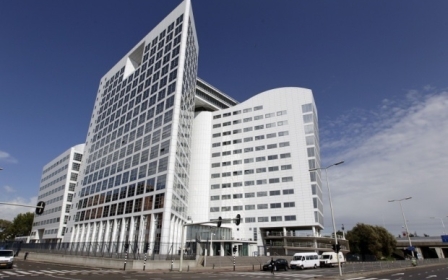INTERVIEW: Palestinian lawmaker Khalida Jarrar

Two days after Palestine formally obtained membership of the International Criminal Court in The Hague, Khalida Jarrar, a senior PLO lawmaker who played a leading role in cementing the Palestinian bid, was arrested by Israeli soldiers for disobeying an order barring her from the city of Ramallah.
In an interview carried out before her arrest, she talked to Middle East Eye about popular resistance, reforming the leadership of the PLO and her left-wing party, the PFLP.
MEE: How tense is the current situation?
Khalida Jarrar: What is going on in Jerusalem or in 48 Palestine should not be seen as individual acts. Maybe they were done by individuals, but how did they come to do what they did? I believe all Palestinians will face this choice, whether they are in political parties or not, because the occupation affects all of us. Palestinians will not maintain their silence, faced with an occupation that daily gets more intense. Last August, soldiers came to my house and they wanted to invite me to report to Jericho for 6 months, because they claim I am affecting the security of Israel. I refused to obey their command and went to the Legislative Council. But the occupation can do anything it wants. They can expel me (from Ramallah) any day they want.
I think the tension will increase. It will not stop. It will produce a more organised and effective leadership, I mean popular leadership, not an official one. This will come from popular resistance, whether they are in political parties or not. I am always asked the question, will we have a third Intifada or not. It's not the question. It's a popular spring and it will develop in a way in which will involve all the people and it will expand.
Israel’s military response to a new Intifada would be to go down the path of annexation, transfers. Are the Palestinian people prepared for even harsher military measures? You have two narratives. One is we are tired, we are exhausted, and Israel has won, and the other is the exact opposite. There are two narratives. This has been going on for so long. What you are saying in terms of new popular uprising, are people prepared to that. People always react to their circumstances and to their dignity, which is very important as well. So the situation is becoming worse and worse so there is nothing to lose.
MEE: There are houses, cars, jobs, businesses to lose
KJ: The majority is living in poverty. It will affect the interest of a very small class of the Palestinian society, but the majority have nothing to lose, wherever they live in cities or off the land. We know there is no struggle without sacrifice and the Palestinian is always ready. Without decisions, without putting the shape. The First Intifada was a different mechanism to the Second Intifada. Why? Because there is PA, because you have to walk to the border, but in the First Intifada the occupation was on your doorstep. I don't know what mechanism the third Intifada will produce.
MEE: It might involve 48 Palestine.
KJ: It might start from there because Israelis are not shy to talk loudly that Israel is for Jews only. What does that mean for a Palestinian living there? They are the native people and they will react, in what way, I don't know.
MEE: During the attack on Gaza, the concept of resistance became popular.
KJ: Resistance itself became popular and this affected the politicians who never talked about resistance. [PLO executive committee member] Yasser Abed Rabbo issued a statement during the war which was different to the one he would usually give. He started to talk in a different voice, a voice that was closer to the people.
MEE: And since then it has gone back to normal?
KJ: I don’t think it has. What started here as an attack on settlers went to Gaza, then to Jerusalem, then West Bank, of course with that in 48. Now, it's concentrated on Jerusalem. Just because there is no leadership does not mean that the feeling itself has gone. Believe me it has not.
MEE: And the UN security council?
KJ: It's a waste of time, in my opinion. I think my party is supporting that, but if it's the only mechanism, it will not lead to anything. The diplomatic approach is important but it's not one that will force the Israelis to leave your land. Only the people can do that.
MEE: You have talked about an alternative political approach to Oslo. What is it ?
KJ: The leadership of PLO is taking all the decisions, but of course there is opposition to Oslo and the so-called peace process. We believe, my party believes in another strategy. Abu Mazen has a strategy, and the question is whether it is an effective one. Abu Mazen’s strategy is negotiation between Israel and the Palestinians under the umbrella of the United States and to pursue that whatever the results. This is a strategy that started from the Madrid Peace Conference (in 1991). Madrid came after the first Intifada. For Abu Mazen the strategy is only to have a diplomatic approach to build the Palestinian independent state. This will lead nowhere because facing all of us is a fascist occupation whose main aim is to build settlements. We need an alternative political approach. I am not talking about resistance but a political approach that we should stop this kind of negotiation.
The political alternative is to go the United Nations asking for an international conference to implement international resolutions, but not to negotiate on international resolutions. Besides that we can use the mechanism of International Criminal Court. On top of that we need to give people the opportunity to create a popular struggle. There are two obstacles to that. Oslo has not failed in the sense that it has created a political, security and economic mechanism to stop such a popular struggle. The second obstacle is that there is no opportunity for a Palestinian leader to abandon the obligations that he is now under. But that point will come. Why? Because these mechanisms can delay, but ultimately they cannot stop the emergence of a new phase of the struggle. This is fuelled by fascist, zionist mechanisms, like settlements, confiscating land, killing Palestinians while having complete impunity under the law to do so, or declaring Israel a Jewish state. The main struggle is not for a Palestinian state. It is for the right of return. The state is part of it, but it cannot be constructed by diplomatic means only.
MEE: How would you reform the leadership of the PLO?
KJ: Maybe there is no leadership now but we believe that this popular movement will improve. Where are the youth coming from? Either they are on the fringes of political parties, or political parties affect them, but they are not organised. This is the reality. The policy of ceasefire, of suppressing an Intifada or resistance, of political arrest and security coordination meetings - this should stop. Any political approach built on this will fail.
From Hamas also there is ceasefire. They do not follow the same political approach, but sometimes in practice, you are seeing that they might have some kind of agreement to play on the same square. What makes it more complicated is the internal division. There is a struggle for power over who is leading not only the PA but who is leading PLO.
The alternative that we are pushing for is an immediate meeting of the temporary leadership which was agreed upon in 2005. This leadership should sit together and evaluate the whole political approach to have a unified strategy. I am talking about the temporary leadership of the PLO including Hamas, and Islamic Jihad, and PFLP is already in the PLO. We always criticise and have another stand and sometimes we are punished for our opinion. This leadership should sit together, evaluate and put a new strategy together. There is a democratic element to this. We believe that the next elections should be for the national council of the PLO not the PLC (Palestinian Legislative Council). These elections to the national council should include all the Palestinian people, here, inside 48 and abroad, and to elect a new leadership. We believe that this will strengthen the Palestinian position.
MEE: Would not Meshaal agree with you on this?
KJ: Meshaal does not just want Hamas in the PLO. He wants to run the PLO in the same way Fatah is now doing. We believe that neither should run the PLO and we should have a collective mechanism that I mentioned. Who runs the PLO is not the point. The point is finding a mechanism to let all the Palestinians share the political decision-making.
Did (Fatah’s) political approach or (Hamas’) struggle put an end to the occupation or create an independent state based on the 1967? No, of course not. Beside that, I believe that whoever leads Israel will share the same Zionist vision. When they talk about Israel as a state for Jewish people, the left and right are agreed upon it. Neither is the international community with us. The US is not only supporting Israel. The US as a policy is convinced of what Israel wants. So we are part of a leftist coalition. We know it's not so strong, but we believe that we express what the majority of Palestinians want, whether they are leftist or not.
MEE: What do you mean by popular resistance, the First Intifada or the second?
KJ: I am talking about all kinds of resistance that the international law allows, including military resistance. Because international law also allows this for a people under occupation. What is violent and what is non-violent? Is a stone violent or not? Israel now wants to jail any Palestinian who throws a stone for 10 years. The violence comes from the occupation not the people who resist it. Let all Palestinians share in the popular resistance. It includes everything, stones, molotov cocktails, the boycotting Israel, organising yourself in cooperatives. People’s creativity is much richer than anything I will say to you. Our people on the ground will always find the tools to struggle if you give them the chance. Their creativity is greater than those of political leaders and their leaders.
MEE: When the two men attacked the synagogue in West Jerusalem, two statements were made by the PFLP. One came from Gaza, saying that the two were members of the military wing of the PFLP and they said, that although they had not authorised it, they were their members. The other statement had almost the same wording, but omitted the claim that they were members of the PFLP.
KJ: I have no information about this. We see the information from the Popular Front, saying that they were comrades, but they did it as individuals, but there is no statement saying that Popular Front did it or are doing this. They said they are comrades of popular front and that is it. Look, this is not a religious war. Leftist parties like the Popular Front and Democratic Front, whether they have been strong in the past or are weaker now, have always been part of the resistance. The point is that we mix between a political approach and the resistance approach. We believe all people should share the resistance.
The question is not that whether the Popular Front is a significant political force in society. I know that PFLP is weaker than before, but I believe that the ideas of PFLP will come to the fore. We have a strong record in the history of the Palestinian struggle and we are not seeking for a religious society also. We believe not only in the national struggle, but national and social democratic struggle. This is why when I talk about the political approach, I am talking to you about democracy, but not the democracy that the PLO leaders are talking about. When we raise our voices against political arrests, we have many members who are in prison. We have also taken part in demonstrations with the Democratic Front against how Hamas is running things in Gaza. We have had thousands of red flags on the streets, not yellow and not green. This is also a message, that our society is not only Hamas and Fatah, there is also the leftist group who becomes more and more popular. When more than 4,000 people go on the Ramallah streets, to tell Fatah that you are not running the Palestinian people, it is significant.
New MEE newsletter: Jerusalem Dispatch
Sign up to get the latest insights and analysis on Israel-Palestine, alongside Turkey Unpacked and other MEE newsletters
Middle East Eye delivers independent and unrivalled coverage and analysis of the Middle East, North Africa and beyond. To learn more about republishing this content and the associated fees, please fill out this form. More about MEE can be found here.




